School of Social Work News
Pages
- 2000+ Social Workers Attend Teletherapy Webinar
“We recognized the increased need for social workers to deliver online teletherapy and telehealth services in the current pandemic,” says Alia Wesala, Assistant Director of Continuing Education. “Many social workers have been forced to work with clients online or by phone for the first time, and they were not prepared for it. It is stressful to suddenly have to figure out how to serve clients remotely. There are many ethical considerations to understand and navigate around system security, privacy, informed consent and HIPAA compliance.”
To meet this training need, Wesala had a teletherapy ethics continuing education webinar ready to go on a short timeline, and it was free. She reached out to Lecturer Elizabeth González who said she could be ready to teach within one week. When ”Teletherapy: Start It Up!” was announced, word got out fast. More than 1,200 social workers and other health professionals from around the country signed up in 24 hours, forcing Wesala to close enrollment out of a concern that participants could exceed the capacity of the webinar platform. In addition, more than 800 have requested copies of the recording. Those wishing to obtain a recording may contact [email protected].
- April 10, 2020
- Learn more »

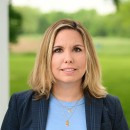 Joseph Himle and Addie Weaver Research on the Opioid Crisis in Rural America Referenced in The Atlantic
Joseph Himle and Addie Weaver Research on the Opioid Crisis in Rural America Referenced in The AtlanticAssociate Dean for Faculty Affairs and Howard V. Brabson Collegiate Professor Joseph Himle and Assistant Professor Addie Weaver, research “A systematic review of rural-specific barriers to medication treatment for opioid use disorder in the United States” is referenced in The Atlantic's “America’s Other Epidemic - A new approach to fighting the opioid crisis as it quietly rages on.” The drug-overdose epidemic has already killed 800,000 Americans—more than have died from AIDS—but the federal government has yet to provide adequate solutions, let alone a level of funding that could stem the crisis.
- April 10, 2020
- Learn more »
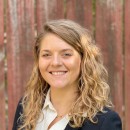 Sara Stein and MI Frontline Support Essential Workers During COVID-19 Crisis
Sara Stein and MI Frontline Support Essential Workers During COVID-19 CrisisMichigan’s frontline workers are providing essential services during the pandemic and they are also dealing with unprecedented stress. Knowing the potential impact of this stress on workers’ psychological well-being, a team including Joint PhD student Sara Stein LMSW, MS and Joy Wolfe Ensor, PhD ‘83, has created MI Frontline Support, a mental health initiative to help frontline workers in Michigan get easy-to-access support from clinicians. Other team members include Erin Barbossa, Felicia Brabec and Sarah Jurkovic.
“The mental health of our doctors, nurses, delivery personnel, grocery clerks, gas station attendants and other essential workers is paramount now more than ever,” says Sara Stein “They are putting their own health and safety, not to mention that of their families, at risk to save others affected by the outbreak, provide needed food and deliver crucial necessities to Michiganders. I feel it’s our responsibility, as social workers and psychologists, to ensure that frontline workers who are supporting all of us during this pandemic can access the mental health care they need.” Members of MI Frontline Support along with members of the southeast Michigan mental health community delivered an online psychoeducational presentation on the mental health risks of the pandemic to frontline workers.
MI Frontline Support’s priority is to develop a detailed list of mental health clinicians who can provide services to essential workers in need. “We invite all licensed Michigan mental health professionals to join this initiative. The list will reduce the barriers that make it difficult to find a provider,” says Stein. MI Frontline Support is removing the long wait to find a therapist, providing easy insurance information for clients who have insurance, pay what you can for those who still have resources, and some volunteer services for frontline workers who can't afford anything.
You can do your part:
- If you are a licensed clinician who wants to be added to the directory of available providers go to MIFrontlineSupport.com and fill out the Google form.
- If you are working or know of someone on the frontlines who is suffering from stress, emotional strain and physical exhaustion and needs help coping, share the list of providers.
During this global pandemic, it is essential to protect Michigan’s frontline workers. Interventions such as MI Frontline Support bolster the mental well-being for workers exposed to COVID-19.
- April 10, 2020
- Learn more »
 Stimulus Checks Might Not Reach Those Who Need Them Most
Stimulus Checks Might Not Reach Those Who Need Them MostAssociate Professor Terri Friedline discusses financial system reform and consumer protections to ensure that people and communities have access to safe and affordable financial products and services during the Coronavirus Pandemic.
- April 9, 2020
- Learn more »
 Addie Weaver’s Research Offers Rural Residents Virtual Treatment for Depression During Pandemic
Addie Weaver’s Research Offers Rural Residents Virtual Treatment for Depression During PandemicAssistant Professor Addie Weaver recently started a pilot program to increase access to depression treatment in rural communities, which often lack mental health professionals, as part of her National Institute of Mental Health-funded Career Development Award. She collaborated with pastors and human service providers from Hillsdale, Michigan to develop an evidence-based, computer-assisted depression treatment program, Raising Our Spirits Together. The computer-assisted program, based on cognitive behavioral therapy, was designed to be delivered in small groups in rural churches, with local pastors serving as facilitators.
As the project was launching, Governor Gretchen Whitmer ordered a “Stay Home, Stay Safe” order to fight the spread of the coronavirus. It was no longer feasible to meet in person for small group sessions at the church. Weaver and her partners had already identified a group of people who needed depression treatment and were concerned about their symptoms worsening due to the additional stresses of social distancing and isolation.
After talking with the pastors and group members, Weaver and her research team retooled the treatment program and now offer Raising Our Spirits Together remotely. Weaver, the pastors, and group members gather online once a week to complete the treatment program. Group members have shared how meaningful it is to continue treatment, stay connected with one another, and to learn new skills and tools to help them manage their depression during this difficult time.
Team members include Associate Dean for Faculty Affairs and Howard V. Brabson Collegiate Professor of Social Work Joseph Himle, Professor Andrew Grogan-Kaylor, Project Coordinator Caroline Landry, Community Research Coordinator Jeffery Johnson, and MSW student Trevor Buys.
By developing solutions during this rapidly changing time, Weaver and her team are providing crucial mental health support to rural community members.
- April 9, 2020
 Anne Blumenthal Selected as Rackham Predoctoral Fellow
Anne Blumenthal Selected as Rackham Predoctoral FellowAnne Blumenthal, Joint Doctoral Program in Social Work and Sociology Candidate, was selected for a 2020-2021 Rackham Predoctoral Fellowship Award. The Rackham Predoctoral Fellowship is one of the most prestigious awards granted by the Rackham Graduate School. The fellowship supports outstanding doctoral candidates working on dissertations that are unusually creative, ambitious and impactful. Blumenthal's abstract is "Services or Surveillance? Contextual Differences in the Role of Trust in Parents’ Engagement with Social Services Aimed at Preventing Neglect."
- April 7, 2020
- Learn more »
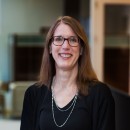 Poverty Solutions with Kristin Seefeldt Publish COVID-19 Pandemic Guide
Poverty Solutions with Kristin Seefeldt Publish COVID-19 Pandemic GuideThe Michigan COVID-19 Pandemic Resource Guide, published by U-M Poverty Solutions aims to make sure the people who would benefit most from these policy changes are able to take advantage of them.
“The guide demonstrates Poverty Solutions’ commitment to action-based research that is responsive to community needs,” said Kristin Seefeldt, Poverty Solutions associate faculty director and an associate professor of social work and public policy.
- March 31, 2020
- Learn more »
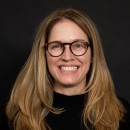
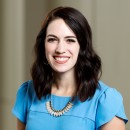 COVID-19 Causing Increased Conflict Between Parents and Children
COVID-19 Causing Increased Conflict Between Parents and ChildrenAssociate Professor and Director of the Parenting in Context Research Lab, Shawna Lee, says parents throughout the country have encountered unprecedented challenges in the midst of the pandemic. The results help to illustrate how Coronavirus is impacting parenting and how adults are coping with Coronavirus. The report highlights an increase in shouting, yelling or screaming at children in the past two weeks. In addition, during that same timeframe, one in six parents spanked or slapped their child. “For a large number of parents, financial concerns, other worries, social isolation, loneliness and sadness are getting in the way of parenting,” said Lee. The report, co-authored by social work doctoral student Kaitlin Ward, examines how parents have responded to their children during the pandemic.
More states are announcing closings for the duration of the school year. Familiar sources of support, such as teachers and school counselors, will no longer be able to look after the health and wellbeing of vulnerable children. The American Academy of Pediatrics recommendation parents avoid physical punishment. Other evidence-based recommendations are below.
- March 31, 2020
- Learn more »
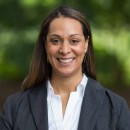 Abigail Eiler Holds Webinar for 1000+ U-M Athletes
Abigail Eiler Holds Webinar for 1000+ U-M AthletesAbigail Eiler, clinical assistant professor and assistant director of athletic counseling hosted a webinar for more than 1000 U-M athletes. "It's called 'Managing My Mental Health After Collegiate Athletics,' " said Eiler, who works with counseling director Greg Harden, MSW '81 and oversees day-to-day counseling operations.
The webinar is just one example of how social work supports the U-M athletic department and student-athletes. The group discussed the COVID-19 pandemic, the NCAA canceling the remainder of the winter and spring sports seasons and other necessary life adjustments. The webinar focused primarily on seniors, most of whom have left campus and are now distributed across nearly every U. S. state and internationally.
- March 31, 2020
- Learn more »
 H. Luke Shaefer Appointed as the Ford School’s Inaugural Kohn Professor of Social Justice and Social Policy
H. Luke Shaefer Appointed as the Ford School’s Inaugural Kohn Professor of Social Justice and Social PolicyToday the Regents of the University of Michigan approved H. Luke Shaefer’s appointment as the inaugural Hermann and Amalie Kohn Professor of Social Justice and Social Policy at the Gerald R. Ford School of Public Policy, for a five-year term, through February 2025.
In 2018, with a generous gift to the Ford School, U-M alumnus Harold L. Kohn and Carol K. Kohn and the Kohn Charitable Trust established the Hermann and Amalie Kohn Professorship in Social Justice and Social Policy. The gift supports a faculty member whose scholarly work and research focus on social justice and gives a voice to those who are disadvantaged in society.
Shaefer has established himself as a major scholar of contemporary American social welfare policy. He is co-author with Kathryn Edin of the acclaimed book, $2 a Day: Living on Almost Nothing in America. Shaefer is the inaugural director of U-M’s Poverty Solutions, an interdisciplinary, cross-campus presidential initiative to inform, identify and test innovative strategies to prevent and alleviate poverty.
“I am deeply honored to be named the Hermann and Amalie Kohn Professor of Social Justice and Social Policy,” says Shaefer. “Above all else in my work, I seek to use evidence and analysis to drive real, positive change for families who are vulnerable. The Kohn family’s generous gift, in memory of Hermann and Amalie, inspires me to continue on in this to the fullest extent I know how.“
Shaefer holds a joint appointment with the School of Social Work and the Ford School. Michigan Social Work Dean Lynn Videka, states, ”Luke Shaefer is an exemplary interdisciplinary scholar and leader in the proudest Michigan tradition. The Hermann and Amelie Kohn Professorship in Social Justice and Social Policy supports the important social justice work that Shaefer’s research informs, and it supports collaboration between Social Work and the Ford School.”
As our country confronts the economic fallout from the coronavirus, Shaefer has been actively engaged as a public voice in the New York Times, and other outlets, on the consequences facing low-income families, and in developing policies to help families weather the crisis here in Michigan.
Shaefer received his Bachelor of Arts from Oberlin College in 2001, and his M.A. in 2005 and Ph.D. in 2008, both in social service administration, from The University of Chicago.
- March 26, 2020